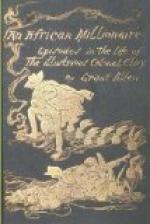It took quite half an hour to explain this imbroglio. But as soon as all was explained, in French and English, to the satisfaction of ourselves and the juge d’instruction, the real Colonel shook hands with us in a most forgiving way, and informed us that he had more than once wondered, when he gave his name at shops in Paris, why it was often received with such grave suspicion. We instructed the police that the true culprit was Medhurst, whom they had seen with their own eyes, and whom we urged them to pursue with all expedition. Meanwhile, Charles and I, accompanied by the Colonel and the attaché—“to see the fun out,” as they said—called at the Bank of France for the purpose of stopping the notes immediately. It was too late, however. They had been presented at once, and cashed in gold, by a pleasant little lady in an American costume, who was afterwards identified by the hotel-keeper (from our description) as his lodger, Mme. Picardet. It was clear she had taken rooms in the same hotel, to be near the Indian Colonel; and it was she who had received and sent the letters. As for our foe, he had vanished into space, as always.
Two days later we received the usual insulting communication on a sheet of Charles’s own dainty note. Last time he wrote it was on Craig-Ellachie paper: this time, like the wanton lapwing, he had got himself another crest.
“MOST PERSPICACIOUS OF MILLIONAIRES!—Said I not well, as Medhurst, that you must distrust everybody? And the one man you never dreamt of distrusting was—Medhurst. Yet see how truthful I was! I told you I knew where Colonel Clay was living—and I did know, exactly. I promised to take you to Colonel Clay’s rooms, and to get him arrested for you—and I kept my promise. I even exceeded your expectations; for I gave you two Colonel Clays instead of one—and you took the wrong man—that is to say, the real one. This was a neat little trick; but it cost me some trouble.
“First, I found out there was a real Colonel Clay, in the Indian Army. I also found out he chanced to be coming home on leave this season. I might have made more out of him, no doubt; but I disliked annoying him, and preferred to give myself the fun of this peculiar mystification. I therefore waited for him to reach Paris, where the police arrangements suited me better than in London. While I was looking about, and delaying operations for his return, I happened to hear you wanted a detective. So I offered myself as out of work to my old employer, Marvillier, from whom I have had many good jobs in the past; and there you get, in short, the kernel of the Colonel.
“Naturally, after this, I can never go back as a detective to Marvillier’s. But, on the large scale on which I have learned to work since I first had the pleasure of making your delightful acquaintance, this matters little. To say the truth, I begin to feel detective work a cut or two below me. I am now a gentleman of means and leisure. Besides, the extra knowledge of your movements which I have acquired in your house has helped still further to give me various holds upon you. So the fluke will be true to his own pet lamb. To vary the metaphor, you are not fully shorn yet.




